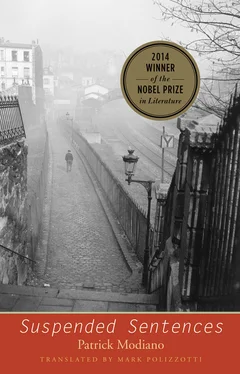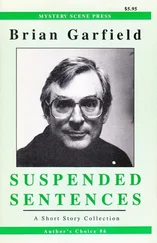But he wasn’t seen in town that year. It was very hot. Flies stuck to the flypaper stretched on the wall of the kitchen. We planned a picnic in the forest with Snow White and Frede’s nephew. What my brother and I liked best was making the bumper car glide over the old planks — a bumper car that we later learned Little Hélène had found through a friend who worked in a fairground.
On Bastille Day, Roger Vincent took us out to dinner at the Robin des Bois inn. He had come from Paris with Jean D. and Andrée K. We sat at a table in the garden of the inn, a garden decorated with groves and statues. Everyone was there: Annie, Little Hélène, Snow White, and even Mathilde. Annie was wearing her light blue dress and wide black belt that hugged her waist very tight. I was sitting next to Andrée K. and I wanted to ask her about the gang she’d been in, the one on Rue Lauriston, but I didn’t dare.
And autumn … We went with Snow White to gather chestnuts in the forest. We hadn’t heard from our parents. The last postcard from our mother had been a bird’s-eye view of the city of Tunis. Our father had written us from Brazzaville. Then from Bangui. And after that, nothing. It was the start of the school season. The teacher, after gym, made us rake up the dead leaves on the playground. In the courtyard of the house we let them fall without raking them up, and they took on a rust-red color that clashed with the light green of the bumper car. The latter seemed stuck for all eternity in the middle of a track of dead leaves. We sat in the bumper car, my brother and I, and I leaned on the steering wheel. Tomorrow we would invent a system to make it glide. Tomorrow … Always tomorrow, like those nighttime visits to the marquis de Caussade’s chateau that we kept postponing.
There was another power outage, and we lit the house with an oil lamp at dinnertime. On Saturday evening, Mathilde and Snow White lit a fire in the dining room fireplace and let us listen to the radio. Sometimes we heard Edith, who was friends with Roger Vincent and Little Hélène. At night, before falling asleep, I leafed through Little Hélène’s photo album, where there were pictures of her, her and her work colleagues. Two particularly impressed me: the American Chester Kingston, whose limbs were as supple as rubber and who could dislocate himself so well that they called him the “puzzle man.” And Alfredo Codona, the trapeze artist Little Hélène told us about so often and who had taught her the trade. That world of circuses and music halls was the only one my brother and I wanted to live in, perhaps because our mother used to take us with her, when we were little, into the wings and dressing rooms of the theaters.
The others still came to the house. Roger Vincent, Jean D., Andrée K…. And the ones who rang at the door after dark, who I spied on through the slats of the blinds, their faces lit by the bulb above the front door porch. Voices, laughter, and telephone rings. And Annie and Jean D., in the 4CV, in the rain.
I never saw them in the years that followed, except, once, for Jean D. I was twenty years old. I had a room on Rue Coustou, near Place Blanche. I was trying to write my first book. A friend had invited me out to a neighborhood restaurant. When I went to join him, he was with two other guests: Jean D. and a girl who was with him.
Jean D. had hardly aged. A few gray hairs on his temples, but he still had his long brush cut. Tiny wrinkles around the eyes. He wasn’t wearing a Canadienne this time, but rather a very elegant gray suit. It occurred to me that we were no longer the same, he and I. Throughout the entire meal, we never once alluded to the old days. He asked what I was doing in life. He used the familiar tu and called me Patrick. He had surely explained to the two others that he’d known me for a long time.
As for me, I knew a little more about him than when I was a child. That year, the kidnapping of a Moroccan politician had been front-page news. One of the protagonists in the affair had died under mysterious circumstances, on Rue des Renaudes, just as the police broke down his door. Jean D. was a friend of that person and the last one to see him alive. He had given testimony that had been reported in the papers. But the articles also contained other details: Jean D. had once served seven years in prison. They didn’t say why, but, judging from the dates, his troubles had begun around the time we lived on Rue du Docteur-Dordaine.
We didn’t say a word about those articles. I simply asked him if he lived in Paris.
“I have an office on Faubourg Saint-Honoré. You’ll have to come by …”
After dinner, my friend disappeared. I found myself alone with Jean D. and the girl who was with him, a brunette who must have been a dozen years younger than he.
“Can I drop you somewhere?”
He opened the door of a Jaguar parked in front of the restaurant. I had learned from the newspaper accounts that in certain circles they called him “the Tall Man with the Jaguar.” Since the start of dinner, I’d been looking for a way to ask him about a past that still remained a mystery.
“Is this car the reason they call you ‘the Tall Man with the Jaguar’?” I asked.
But he merely shrugged and didn’t answer.
He wanted to see my room on Rue Coustou. He and the girl, behind me, climbed the narrow staircase whose worn red carpet gave off a funny odor. They came into the room and the girl took the one chair — a wicker armchair. Jean D. remained standing.
It was strange to see him in that room, in his elegant gray suit and dark silk tie. The girl looked around her and didn’t seem very enthusiastic about the décor.
“So, you’re a writer? How’s it working out?”
He leaned over the bridge table and looked at the sheets of paper that I labored to fill, day after day.
“You write with a Bic?”
He smiled.
“Does the place have heat?”
“No.”
“But you’re getting by?”
What could I tell him? That I didn’t know how I was going to find five hundred francs to pay the rent this month? Of course we’d known each other a long time, but that was no reason to unburden myself on him.
“I’m getting by,” I said.
“Doesn’t seem like it.”
For a moment, we faced each other in the window frame. Even though they called him “the Tall Man with the Jaguar,” I was now a little taller than he was. He covered me with a look that was affectionate and naïve, the same as in the days of Rue du Docteur-Dordaine. He rolled his tongue between his lips, and I remember that he’d done that at the house, too, when he was thinking. That way of rolling his tongue between his lips and being lost in thought is something I later discovered in someone else — the writer Emmanuel Berl — and it moved me.
He kept silent. So did I. His girlfriend was still sitting in the wicker chair and leafing through a magazine that she’d grabbed off the bed. All things considered, it was better that the girl was there, otherwise we would have started talking, Jean D. and I. It hadn’t been easy: I could read it in his eyes. At the first words, we would have collapsed like those puppets in shooting galleries when the pellet hits the mark. Annie, Little Hélène, and Roger Vincent had certainly wound up in jail. I had lost my brother. The thread had snapped — a gossamer strand. There was nothing left of all that …
He turned to his girlfriend and said:
“There’s a nice view from here … It’s just like the Côte d’Azur.”
The window looked out on narrow Rue Puget, where no one ever walked. A shabby bar on the corner, a former Coal and Spirits shop in front of which a solitary streetwalker stood waiting. Always the same. And for nothing.
“Nice view, eh?”
Jean D. inspected the room, the bed, the bridge table at which I wrote every day. I saw him from the back. His friend leaned her forehead against the window and contemplated Rue Puget below.
Читать дальше












